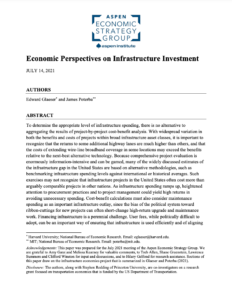Full Title: Economic Perspectives on Infrastructure Investment
Author(s): Edward Glaeser, James Poterba
Publisher(s): Aspen Economic Strategy Group
Publication Date: July 14, 2021
Full Text: Download Resource
Description (excerpt):
To determine the appropriate level of infrastructure spending, there is no alternative to aggregating the results of project-by-project cost-benefit analysis. With widespread variation in both the benefits and costs of projects within broad infrastructure asset classes, it is important to recognize that the returns to some additional highway lanes are much higher than others, and that the costs of extending wire-line broadband coverage in some locations may exceed the benefits relative to the next-best alternative technology. Because comprehensive project evaluation is enormously information-intensive and can be gamed, many of the widely discussed estimates of the infrastructure gap in the United States are based on alternative methodologies, such as benchmarking infrastructure spending levels against international or historical averages. Such exercises may not recognize that infrastructure projects in the United States often cost more than arguably comparable projects in other nations. As infrastructure spending ramps up, heightened attention to procurement practices and to project management could yield high returns in avoiding unnecessary spending. Cost-benefit calculations must also consider maintenance spending as an important infrastructure outlay, since the bias of the political system toward ribbon-cuttings for new projects can often short-change high-return upgrade and maintenance work. Financing infrastructure is a perennial challenge. User fees, while politically difficult to adopt, can be an important way of ensuring that infrastructure is used efficiently and of aligning funding with those who reap the benefits of new projects. With a few exceptions, such as public transit buses, infrastructure use is progressive. In cases in which user fees may be regressive, it may be possible to design compensatory policies, such as transit system vouchers for low-income households, to offset distributional concerns while preserving the efficiency benefits of use-related charges. Public-private partnerships require careful analysis on a case-by-case basis. While they can deliver operational and procurement benefits relative to similar projects managed exclusively by the public sector, they can also impose unpriced risks on taxpayers, and in some cases can impose a long-term increase in the cost of infrastructure use in return for a short-term relaxation of public sector liquidity constraints.
